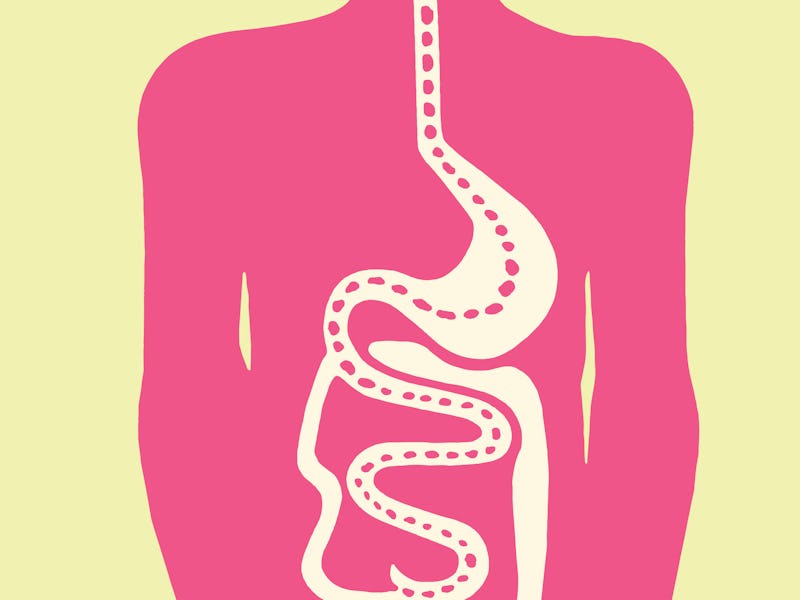Gut discovery explains another crucial aspect of health
Cells that help us absorb nutrients change based on what we eat.

As omnivores, our intestines have the delicate task of digesting a turkey leg just as effectively as a stalk of celery — all while still preventing harmful bacteria from sneaking in.
A new study demonstrates just how related these processes are to one another, revealing new ways that diet and nutrient uptake regulate the intestines’ defense system down to the cellular level.
Zuri Sullivan is the study’s lead author and a post-doctoral fellow in Harvard’s Department of Molecular and Cellular Biology. The gut adapts immediately to what we eat, she tells Inverse.
“That's something that we didn't know before on a comprehensive level,” Sullivan says.
This study also marks “the first time that we can see an immune cell that’s directly involved in nutrient uptake,” Sullivan explains. Parts of the immune system, the study suggests, defend the body against pathogens and regulate which nutrients are absorbed by the small intestine. This part of the body is part of the gastrointestinal system.
These findings were published Thursday in the journal Science and add to our understanding of the importance of diet and gut health.
LONGEVITY HACKS is a regular series from Inverse on the science-backed strategies to live better, healthier, and longer without medicine. Get more in our Hacks index.
SCIENCE IN ACTION — The study team fed mice a high-carbohydrate diet and a high-protein diet and compared how cells lining the intestine, called epithelial cells, changed in response.
Specifically, they looked at what Sullivan called the “nutrient handling machinery” of digestion — a system of enzymes and transport proteins that are activated in response to the availability of certain nutrients. Specialized sub-groups of intestinal cells appeared more or less frequently based on the availability of nutrients, suggesting the small-intestine epithelium (a collection of epithelial cells) actually remodeled itself based on the type of diet.
They also made another surprising discovery: One kind of immune cell, called γδ T cells, seemed to be regulating the whole process. These immune cells are found in large numbers wherever the body is exposed to the outside environment, like the gut, skin, and female reproductive tract.
HOW THIS AFFECTS LONGEVITY — This study drew a direct connection between the digestive system, its uptake of nutrients, and our body’s ability to defend against outside threats. If the very same chemical signals that regulate nutrient uptake can also change the behavior of immune cells, it can give us insight into how and why our body reacts the way it does to certain diets — and how to treat related medical problems.
“... the gut is adapting to what it’s being fed.”
While there was no definitive finding that one diet in the study was more beneficial than another to the mice, the newly found relationship between immune cells and nutrition can have implications for treating diseases that have huge impacts on life expectancy. For example, malnutrition in countries where bacterial infections are common.
Though Sullivan said more research needs to be done to know for sure, she hypothesizes that one of the reasons children with repeated bacterial infections have malnutrition is because the same signals that help them fight off bacteria also keep their body from absorbing nutrients.
WHY IT'S A HACK — To know that our intestines evolved to be able to adapt their function to every food we can fit in our mouths makes it a little less daunting to mix up your diet — despite some unpleasant effects from abrupt switches.
For example, changing suddenly from a diet that’s heavy on one food group to a very different diet can activate a strong response from our gut, Sullivan explains.
“If you're a vegetarian, and you don't eat meat for a year, let's say, and then all of a sudden, you decide, ‘oh, you know, screw it, I'm gonna have a cheeseburger,’ you'll have some serious digestive discomfort,” Sullivan says. “And the reason we think that occurs is because the gut is adapting to what it's being fed.”
But Sullivan doesn’t think it’s bad to change diets. In fact, she hypothesizes that’s why this system exists. Ultimately, “we evolved under conditions in which the availability of carbohydrates versus protein versus fat changes based on the seasons, or the habitats that we happen to be in,” she says.
And though the direct effect of certain diets on the immune system isn’t certain — that’s what Sullivan is studying next — she has some theories.
“It's likely that if you have a bacterial infection, you may not be absorbing nutrients as efficiently because now your gut has gotten into a mode of, ‘let's go fight this infection and prioritize that over absorbing nutrients,’” she says.
All the more reason to call out when you’re sick: Not only is your immune system compromised, your intestines might be too.
HACK SCORE OUT OF 10 — 👅 👅 👅 👅 (4/10)